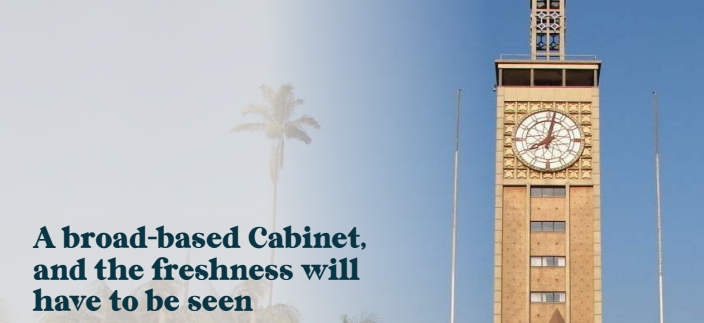A broad-based Cabinet, and the freshness will have to be seen.

President Wiliam Ruto’s Cabinet has reported to work, and his administration now begins a second attempt at running the country after two tumultuous and wholly unexpected months.
While there were concerns about the integrity of some of his Cabinet picks from the Orange Democratic Movement, and those he reappointed from the first Cabinet, his choices sailed through without much fuss. Only Stella Lang’at, who was destined for the Gender docket, was rejected for a lacklustre performance at the vetting by the National Assembly that suggested incompetence.
President Ruto’s accommodation of the erstwhile Opposition will give him some respite in Parliament and the opportunity to consolidate political support. The youthful and genuinely idealistic protestors remain angry at a variety of things, but without a form and representatives, it is difficult to engage them using the traditional means. Their demands would, however, be addressed by the administration doing the right things, which is the real test.
One of the issues raised was on the opulence apparent in the Government, which ranged from individuals showing off expensive watches, belts, shoes and jackets to ministries and agencies purchasing the newest models of SUVs.
During the vetting process, retained nominees surprised many at how fast some had increased their net worth. Some had, in about 18 months, increased their net worth by more than KSh100 million at a time when a majority of Kenyans are barely surviving the harsh economy. The nominees attributed this to appreciation of their assets and businesses, over the period.
Narc-Kenya party leader Martha Karua has remained critical of the administration as her party breaks away from Azimio, and ODM.
“The vetting was a circus, not what people expected. Kenyans don’t expect people to just routinely be asked how much they are worth; they are not questioned about their sources of wealth. Those who have served and who two years ago gave us what they thought was their net worth, some had accelerated their wealth astronomically by 100 percent. I don’t think property values have gone up by 100 percent. You would have expected follow-up questions,” she said on Citizen TV on August 6.
The Narc-Kenya party leader poked holes into the vetting exercise describing it as being conducted by a Parliamentary committee that seemingly appeared to be in the President’s pocket. “The vetting became a circus in Parliament, another discredited institution. The message is that this is more of the same, nothing has changed, nothing will change, and that the regime is tone deaf to the demands of Kenyans, as fronted by the Gen Z,” she said.
However, President Ruto has defended the establishment of a broad-based government, stating that the country needed to make a fresh start. President Ruto first made the comments during a town hall meeting in Mombasa on why he reappointed some Cabinet Secretaries (CSs) he had sacked.
He said there was a need to start over because he had told Kenyans that they were going to have a broad-based government and a fresh start. The President added that the retained CSs should know that it is not about friendship but about having a second chance to start over. “Now you must know that this is new, that the conditions are different. We may have been friends, but now the conditions are different,” President Ruto said during the town hall meeting.
The President added that it was necessary to have people from the opposition because the country has long been divided by party affiliations. The President is on record stating that he is not very keen on who takes credit, but he is keen on the transformation of the country.
“With the formation of this broad-based government that brings together former political rivals into one selfless, patriotic team, we will unlock the potential of our country that has long been denied to us by factional and sectarian competition. Our potential as a nation and the attainment of that potential has often been undermined by divisions arising from political competition,” President Ruto said.
The President acknowledged that competition is good, but there is a moment when the interest of the nation is greater than the interest of a political formation. “It is the reason I have reached out across the aisle to bring onboard the knowledge, expertise and experience of deserving Kenyans though belonging to a different political formation,” he said after presiding over the swearing-in of his newly reconstituted Cabinet at State House, Nairobi.
The 19 members of the newly reconstituted Cabinet
- Prof. Kithure Kindiki – CS, Ministry of Interior and National Administration
- Roselinda Soipan Tuya – CS, Ministry of Defence
- John Mbadi Ng’ongo – CS, The National Treasury and Economic Planning
- Justine B.N. Muturi – CS, Ministry of Public Service and Human Capital Development
- Aden Bare Duale – CS, Ministry of Environment, Climate Change and Forestry
- Alice Wahome – CS, Ministry of Lands, Public Works, Housing and Urban Development
- Julius Migos Ogamba – CS, Ministry of Education
- Davis Chirchir – CS, Ministry of Roads and Transport
- Hassan Ali Joho – CS, Ministry of Mining, Blue Economy and Maritime Affairs
- Salim Mvurya Mgala – CS, Ministry of Investments, Trade and Industry
- Rebecca Miano – CS, Ministry of Tourism and Wildlife
- Dr. Alfred Nganga Mutua – CS, Ministry of Labour and Social Protection
- Eric Muriithi Muuga – CS, Ministry of Water, Sanitation and Irrigation
- Dr. Debra Mlongo Barasa – CS, Ministry of Health
- Kipchumba Murkomen – CS, Ministry of Youth Affairs, Creative Economy and Sports
- James Opiyo Wandayi – CS, Ministry of Energy and Petroleum
- Dr. Margaret Nyambura Ndung’u – CS, Ministry of Information, Communication and Digital Economy
- Wycliffe Ambetsa Oparanya – CS, Ministry of Co-operatives and Micro, Small and Medium Enterprises (MSMEs) Development
- Dr. Andrew Mwihia Karanja – CS, Ministry of Agriculture and Livestock Development

